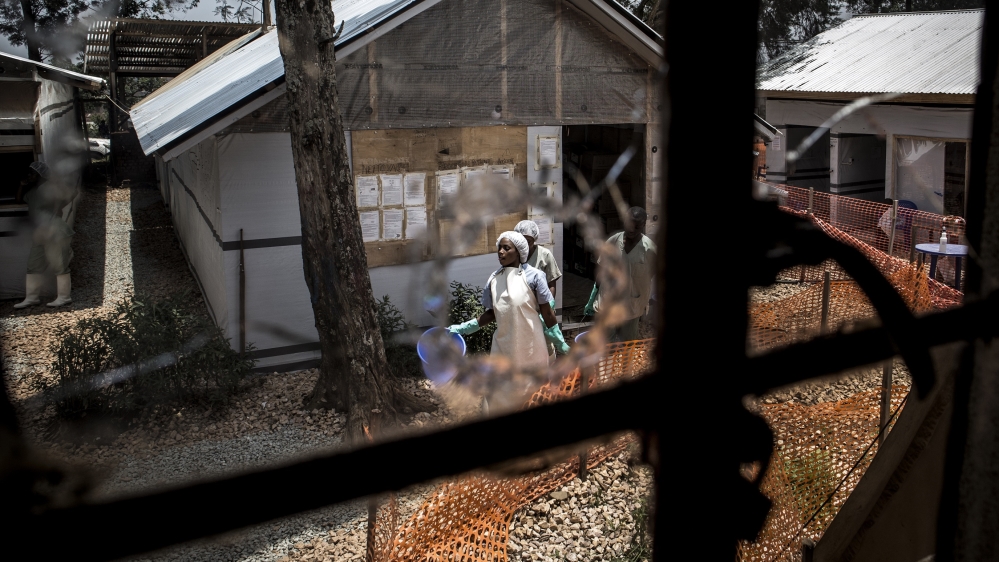Community mistrust worsening DR Congo Ebola outbreak: study
One out of four people interviewed in eastern Congo last year believed Ebola wasn’t real, according to a new study, underscoring the enormous challenges health care workers are now facing.
Health workers said public mistrust is now the biggest obstacle to stopping the epidemic, with many refusing vaccines, resisting treatment and concealing symptoms, as the world’s second-biggest Ebola outbreak spreads.
The survey found that mistrust resulted in people being 15 times less likely to seek medical treatment at an Ebola health center, according to the study published in the The Lancet Infectious Diseases journal.
The study released on Wednesday was based on interviews conducted last September, about a month after the outbreak began. It comes as the number of probable and confirmed cases has exceeded 1,000.
At least 639 people have died from Ebola in eastern Congo since August in what is now the second deadliest outbreak in history, according to the World Health Organization.
|
Attacks on DRC’s Ebola treatment facilities threatens progress 1:53 |
In recent weeks, there have been on average eight new cases per day said the country’s health ministry.
The outbreak’s response has been hampered by a series of deadly attacks on Ebola health centers since the study was completed. As a result, Doctors Without Borders has stopped staffing two health centers at the outbreak’s epicenter after violent attacks.
Researchers found that trust in public authorities had already fallen in the cities of Beni and Butembo before Ebola hit, due to decades of conflict and poor governance.
‘Paying the consequences’
“It’s been three years now that we saw a declining level of trust in those actors, and the Ebola crisis comes on top of that and accelerates the distrust,” said Patrick Vinck, of Harvard University, who led the research.
“In some ways, we are now paying the consequences of many years of lack of interest and focus on this issue.”
Eva Erlach, the community engagement and accountability delegate for the International Federation of Red Cross and Red Crescent Societies (IFRC), called the findings “absolutely interesting” and said they show how the level of trust correlates with preventative behaviors.
The organisation has had more than 800 trained volunteers working to get out prevention messages amid the region’s security challenges.
“There is still a part of the community who do not believe that Ebolais real and we definitely still need to continue focusing on community engagement,” said Erlach, who was not part of the study. “And this is why this report is so helpful even if it’s from September.”
WHO Director-General Tedros Adhanom Ghebreyesus said earlier this month he was encouraged “to see the communities accepting the response more and more”.
The study highlights just how pervasive misinformation has been in places in eastern Congo like Beni and Butembo, where in-person interviews were conducted with 961 people.
Some 25.5 percent of those interviewed did not believe Ebola was real. In addition, nearly 45.9 percent of people thought the Ebola outbreak was being fabricated to destabilize the region or for financial gain.
Additionally 18.2 percent believed all three of those statements, the study found.
Volatile security situation
Those who didn’t believe Ebola was real were far less likely to agree to agree to the Ebola vaccine or to go to a treatment center. Ebola is spread through the bodily fluids of the sick, and isolation of those infected is key to stopping transmission.
 |
| Attacks on Ebola treatment centers in eastern Congo also hamper the health response. [John Wessels/AFP] |
This outbreak has been uniquely challenging because of the volatile security situation in the region. Eastern Congo is home to numerous armed groups and the Ebola epidemic has deepened the political and economic grievances of many in the area. The fact that people in Ebola affected areas were excluded from the December presidential election has only heightened conspiracy theories.
Tariq Riebl, of the International Rescue Committee, who is currently working in eastern Congo, said the findings released Wednesday mirror what he and his colleagues are seeing on the ground. Concern remains about how Ebola prevention efforts are going because new cases are still emerging.
“Once you reach a wider outbreak zone, especially urban zones, the community engagement and prevention side of things is almost more important than the treatment side,” Riebl said.
“If you can’t have those messages out successfully, it doesn’t matter if you have all the treatment options available because no one is ever arriving to take advantage of that,” he said.
The world’s worst epidemic of Ebola, a hemorrhagic fever, killed more than 11,300 people in West Africa from 2013 to 2016.




